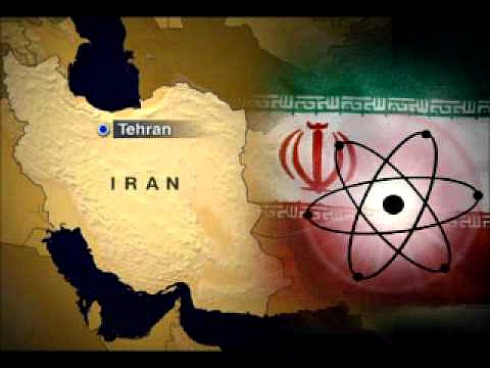Archives
AND MORE...

U.S. Grants Exemptions From Iran Sanctions
_____________________

Just Spinning Along
_____________________

Bombs & Kooks: A Winning Combo
____________________

Bypassing Sanctions... Again
_____________________

So Much For Sanctions...
_____________________
July 22, 2012
Message From The 'Other Side'
There are two sides to the national security debate, i.e., the knowledgeable and informed side that makes sense; and the side that ISN’T and DOESN’T. Below is an example of the latter from the paper of record for the other side, i.e., the New York Times, .
“It is in the interest of the United States and its allies to keep talking [with Iran],“ opines the Times, even though years of talks have failed to produce results, and sanctions have been in place, to varying degrees, since 1979. Not only have these efforts failed to change Iran’s behavior, but they've allowed Iran to become the #1 state sponsor of terrorism in the world.
As to waiting for Godot, i.e. the “new round of sanctions [that] are scheduled to go into effect [on June 28],” the Times conveniently neglects to mention the number of nations that have obtained U.S. exemptions or waivers; or nations like China and Russia (not to mention the UN), that not only have zero intention of cooperating with these sanctions, but are likely to aid and abet in violating them.
The Times closes with “critics neglect to mention that Iran’s program grew significantly when George W. Bush was president and opportunities were lost to constrain it at a much lower level.” While never missing an opportunity to bash Bush, the Times forgets that Iran has been working on its nuclear program for decades, long before Bush ever became president. And then there's former U.S. President Jimmy Carter, of course, and his inept response to Iran’s 1979 revolution and the U.S. embassy hostage crisis, but we digress...
As for the patently ridiculous statement that “[n]o president has been as successful as Mr. Obama in rallying the major powers to impose sanctions with bite,” memo to the Times: The goal is to STOP Iran from obtaining nuclear weapons, not to engage in meaningless group activities!
New York Times Editorial | July 22, 2012
Sanctions Against Iran

Photo courtesy: wn.com
It is disappointing but not surprising that two days of negotiations this week failed to produce any real progress toward curbing Iran's nuclear program. Iran, always playing the angles, is still trying to figure out how much economic pain it is willing to accept to maintain its nuclear ambitions and what, if anything, it is willing to give up.
It is in the interest of the United States and its allies to keep talking, especially since a new round of sanctions are scheduled to go into effect. On June 28, the United States can start barring foreign banks doing oil-related business with the Central Bank of Iran from access to the American financial market. Starting on July 1, all members of the European Union will be prohibited from buying oil from Iran and insurance for ships that carry Iranian oil.
The meetings in Moscow were the third in a series involving Iran and the United States, Russia, China, France, Britain and Germany. To avoid a collapse in talks, they agreed that lower-level experts will meet on July 3.
The goal has to be to shut down all of the program that gives Iran the capability to build a bomb. The United Nations Security Council ordered that all enrichment should be ended six years ago, but the major powers were right to start the talks with a more short-term goal: to stop the most dangerous kind of enrichment.
Negotiators offered fuel for a medical reactor and aircraft replacement parts if Iran agreed to stop enriching uranium to 20 percent purity — near bomb grade — send its stockpile out of the country for fabrication into fuel rods and shut the underground facility at Fordo where the 20 percent enrichment is taking place.
Iran hinted in Moscow that it might limit enrichment to below that level but wanted more relief from sanctions and for the major powers to declare that it has a right to enrich uranium. The major powers say Iran will have that right if it proves it is not building a weapon.
We don't know if any mix of diplomacy and sanctions will persuade Iran to give up its ambitions. But there is no quick military fix. Even a sustained air campaign would likely set Iran's nuclear program back only by a few years and would rally huge sympathy for Tehran both at home and abroad. The current international consensus for sanctions, and the punishments, would evaporate.
That hasn't stopped American politicians from both parties from posturing on the issue. Before the Moscow talks, 44 Republican and Democratic senators sent President Obama a letter demanding that he abandon negotiations if there were no Iranian concessions.
The critics neglect to mention that Iran's program grew significantly when George W. Bush was president and opportunities were lost to constrain it at a much lower level. No president has been as successful as Mr. Obama in rallying the major powers to impose sanctions with bite. These are the first serious nuclear talks in years, and there is still time to let them run.
Original article here.
Log In »
Notable Quotables
"Mr. Netanyahu is one of the most media-savvy politicians on the planet. On Friday he appeared live via video link on 'Real Time with Bill Maher,' taking the host’s alternately sardonic and serious line of questioning with gazelle-like alacrity."
~ Anthony Grant, jourrnalist who has written for many major newspapers and worked in television at Paris and Tel Aviv, interviewing former PM Benjamin Netanyahu on Monday, at the outset of Mr. Netanyahu's new book (more here).


